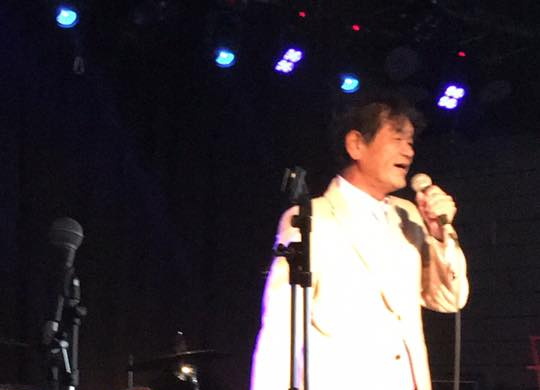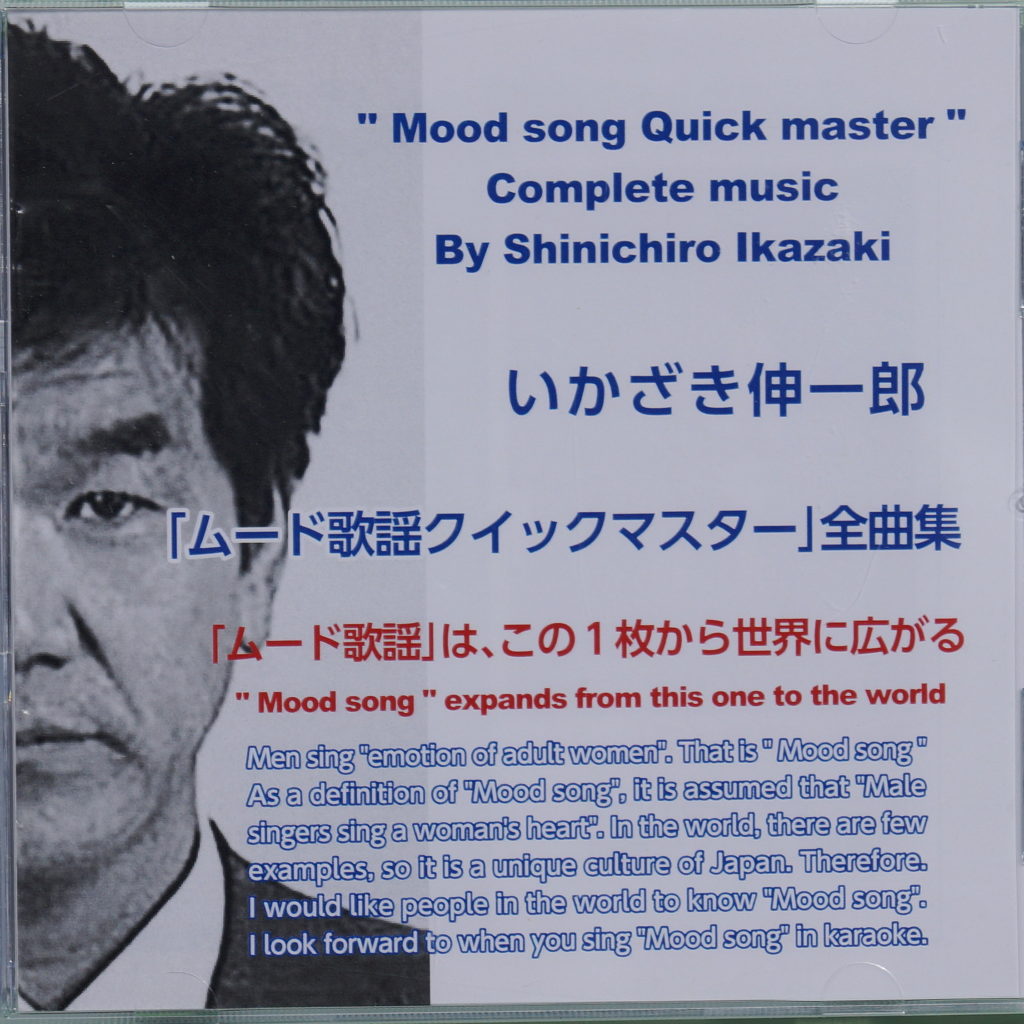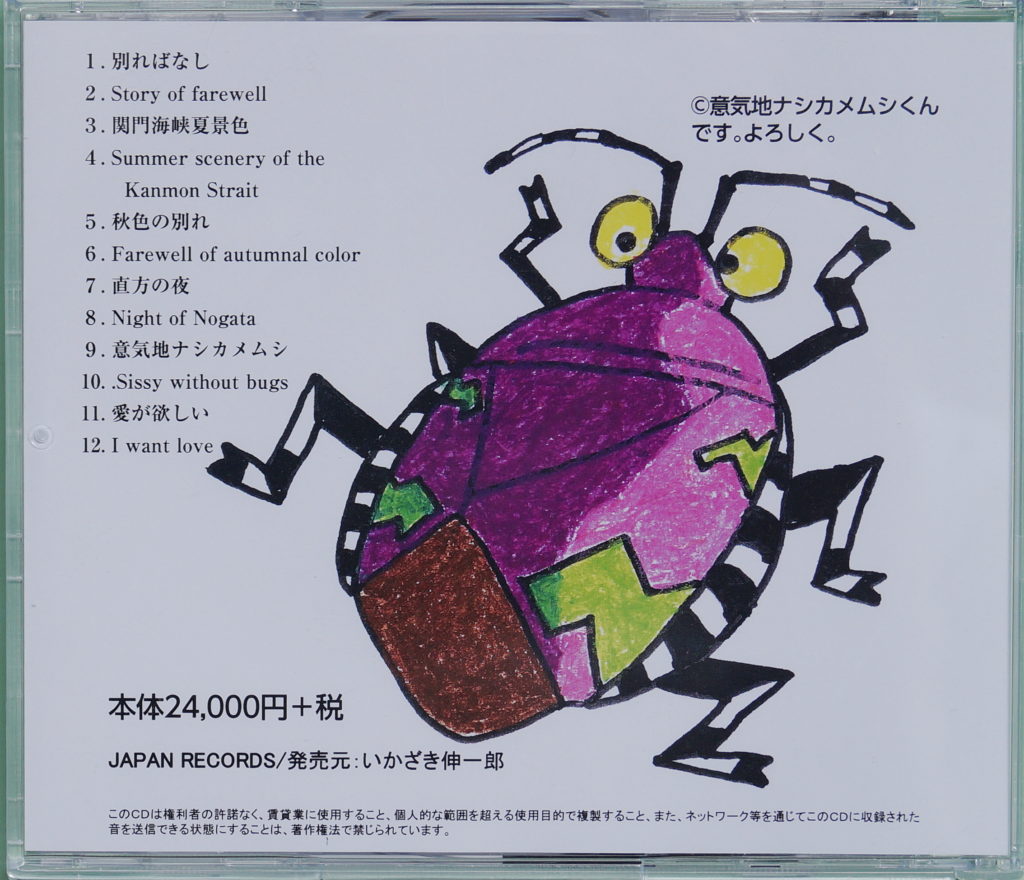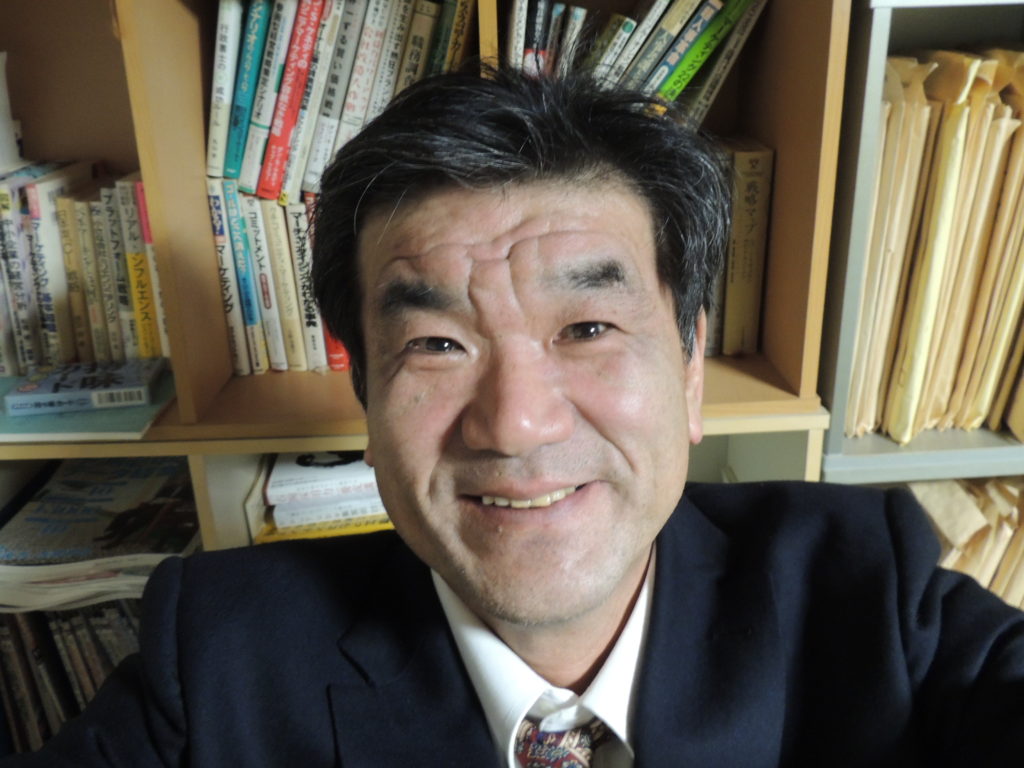
Singing with a concert 
Of course! Talk too. 
Taking insects! 
I’m working?
●ごきげんいかがですか?歌手のいかざき伸一郎です。
ムード歌謡を歌ってます。
では、さっそく聴いてください。「別ればなし」
●1番、(歌)「別ればなし」5分
●(MC)5分
(前に、付箋台を置き、スケッチブックを載せる)
(スケッチブック1枚目:「60歳から覚えてね!英単語コーナー」の文字見せながら)
ありがとうございました。(深く礼をする)
じつは私、今。英単語を覚えています。
ただ。年を取ったらダメですね。覚えることはできるのですが。その後は残念!
リアルに表現すれば、ザルで水をすくうようなもの。
せっかく覚えた英単語が、頭からザーザーとこぼれ落ちてしまいます。
Thank you very much
Actually, I am studying English words now.
However, it is not good if you get older. I can remember, but sorry afterwards!
After that, it will be disappointing.
If you express it realistically. Kind of like drawing water in a colander.
The English words that I have learned are spilled out of my head.
むかし。年表や英単語を覚えるための文書がありましたよね。
そして。一度覚えたら、忘れませんでしたよね。
そうです。そんな文書を、英単語ごとにつくればいいんです。
Old days. There were documents for memorizing chronological tables and English words.
And. Once you remember, you did not forget.
That’s right. Just create such a document for each English word.
そして。TOEICテストによく出る英単語が、手軽に覚えられるよう!
作詞家でもある私、いかざき伸一郎は、心に残るよう、英単語を作詞しました。
そして。その文書を、みなさんに紹介します。
「60歳から覚えてね!英単語」コーナー。を、開催します。お楽しみに~。
And. English words frequently used in the TOEIC test can be easily remembered!
Shinichiro Ikazaki, who is also a lyricist, wrote English words in a memorable way.
And. I will introduce that document to everyone.
The ” Japanese language course from 60 years old ” corner will be held.
Let’s looking forward to it!
では、さっそく、はじめます。
今回のテーマは、続専門職人。
(スケッチブック2枚目:「続専門職人で覚える英単語」の文字見せながら)
前回に続き、専門職人です。
これからのAI時代。AIに仕事を奪われる。かも。
今回も。AIに負けてたまるか!そんな気合が入った気持ちで、英単語を覚えましょう!
では。まずは、こちら。
So, let’s get started.
The theme this time is. Let’s learn Japanese withProfessional craftsman again.
Continuing from the last time, the theme is professional craftsmen. The coming AI era. We are robbed of work by AI. maybe. This time too. I shouldn’t lose to AI! Let’s learn Japanese words with such a feeling!
OK. First, here.
(スケッチブック3枚目:「下記の単語を書いた」の文字見せながら)
Occupation。
職業。
オキュペイション。職業。という意味ですね。
はい。では。なぞかけのノリでいきますね。
オキュペイション。とかけて。職業。と解く。その心は。
Occupation. Shokugyo. That means.
Yes. OK. I do it in a next way.
Occupation. Tokakete. Shokugyo. Totoku. Sonokokorowa.
(スケッチブック4枚目:「下記の言葉を書いた」の文字見せながら)
大きゅうペイ、しょんぼり。賭け事の職業。
パチプロのような専門職ですね。
はい。続いて。
Okyupei, shombori. Kakegono shokugyo.
It’s a profession like Pachipro.
Yes. continue.
(スケッチブック5枚目:「下記の単語を書いた」の文字見せながら)
Cheaper
より安価な
チーパー。より安価な。という意味ですね。
チーパー。とかけて。より安価な。と解く。その心は。
Cheaper. Yriankana.That means.
Cheaper. Tokakete. Yriankana. Totoku. Sonokokorowa.
(スケッチブック6枚目:「下記の言葉を書いた」の文字見せながら)
チー、パーになり、より安い手となる雀士
若いときは。よく麻雀してました。プロ雀士といえば、小島武夫プロが好きでした。
はい。つぎ。
Ch, paninari, yoriyasuite tonaru janshi.
When I was young. I had play mahjong every day.
Speaking of professional Mahjong player, I liked Takeo Kojima.
Yes. Next.
(スケッチブック7枚目:「下記の単語を書いた」の文字見せながら)
Clarify。
明確にする。
クラリファイ。明確にする。という意味です。
クラリファイ。とかけて。明確にする。と解く。その心は。
Clarify. Meikakunisuru. That means.
Clarify. Tokakete. Meikakunisuru. Totoku. Sonokokorowa.
(スケッチブック8枚目:「下記の言葉を書いた」の文字見せながら)
蔵利、ファイナンシャルプランナーが明確にする。
豪商の古い蔵。お宝いっぱいです。
なんでも鑑定士に依頼して、その価値をファイナンシャルプランナーが明らかにします。
はい。では。
Kurari, fuainansharupurannaga meikakunisuru.
An old warehouse of a wealthy merchant. It’s full of treasure.
The financial planner will reveal its value by ask appraisers for anything.
Yes. OK.
(スケッチブック9枚目:「下記の単語を書いた」の文字見せながら)
Architect。
建築家。
アーキテクト。意味は。建築家。
アーキテクト。とかけて。建築家。と解く。その心は。
Architect. That means. Kenchikuka.
Architect. Tokakete. Kenchikuka. Totoku. Sonokokorowa.
(スケッチブック10枚目:「下記の言葉を書いた」の文字見せながら)
線引くの飽きて苦と、言う建築家。
設計図に毎日なん時間も、線引けば。そうなるでしょう。
はい。では、つづいては。
Senhikuno akite kuto, iu kenchikuka.
He would be that if he drew line for design every day.
Yes. Then, next.
(スケッチブック11枚目:「下記の単語を書いた」の文字見せながら)
Critic。
評論(批評)家。
クリティック。評論(批評)家。という意味です。
では。クリティック。とかけて。評論家。と解く。その心は。
Critic. Hyoron(Hihan)ka. That means.
OK. Critic. Tokakete. Hyoronka. Totoku. Sonokokorowa.
(スケッチブック12枚目:「下記の言葉を書いた」の文字見せながら)
ちくりテックニシャンの評論家。
評論家って。そんなもんでしょう。
はい。では、つぎ。
Chikuri tekkunishanno hyoronka.
Critics is like that.
Yes. Then, next.
(スケッチブック13枚目:「下記の単語を書いた」の文字見せながら)
Succeed
成功する
サクシード。成功する。という意味です。
サクシード。とかけて。成功する。と解く。その心は。
Succeed. Seikosuru. That means.
Succeed. Tokakete. Seikosuru. Totoku. Sonokokorowa.
(スケッチブック14枚目:「下記の言葉を書いた」の文字見せながら)
作戦が成功する。彼は策士ど。
黒田 官兵衛のような。戦略家ですね。
はい。では。
Sakusenga seikosuru. kareha sakushido.
Like Kuroda Kanbei. He is a strategist.
Yes. OK.
(スケッチブック15枚目:「下記の単語を書いた」の文字見せながら)
Exams
試験
イグザームス。試験。という意味です。
イグザームス。とかけて。試験。と解く。その心は。
Exams. Shaken. That means.
Exams. Tokakete. Shaken. Totoku. Sonokokorowa.
(スケッチブック16枚目:「下記の言葉を書いた」の文字見せながら)
イ草、蒸す。畳職人の試験。
畳の原料、イ草。どんな試験なんでしょう?
はい。では、こちら。
Igusa, musu. tatamishokuninno shiken.
Raw material for tatami mats, rush. What kind of test is it?
Yes. Then here.
(スケッチブック17枚目:「下記の単語を書いた」の文字見せながら)
Revenue
収入、収益
レヴェニュー。意味は。収入、収益。
レヴェニュー。とかけて。収入。と解く。その心は。
Revenue. Meaning. Shunyu, Shueki.
Revenue. Tokakete. Shunyu. Totoku. Sonokokorowa.
(スケッチブック18枚目:「下記の言葉を書いた」の文字見せながら)
語り部、ニューバージョンで、より多くの収入を得る。
どんなニューバージョンか?わかりませんが。重要な仕事です。
はい。では、こちらの。
Kataribe, nyubajonde, yoriokuno shunyuwo eru.
What new version is it? I do not know. It’s an important job.
Yes. Then here.
(スケッチブック19枚目:「下記の単語を書いた」の文字見せながら)
Quote
相場、見積価格
クウォウト。相場、見積価格。という意味です。
クウォウト。とかけて。相場。と解く。その心は。
Quote. Soba, Mitsumorikakaku. That means.
Quote. Tokakete. Soba. Totoku. Sonokokorowa.
(スケッチブック20枚目:「下記の言葉を書いた」の文字見せながら)
相場師で食おうとしてもムリ。
相場。難しいですね。まさしく。失敗したら。オキュペイションです。
では、最後。
Sobashide kuoto shitemo muri.
The speculation is difficult, isn’t it? If you fail. It’s a big loss.
Then the last.
(スケッチブック21枚目:「下記の単語を書いた」の文字見せながら)
Probably
おそらく
プロバブリー。おそらく。という意味です。
プロバブリー。とかけて。おそらく。と解く。その心は。
Probably. Osoraku. That means.
Probably. Tokakete. Osoraku. Totoku. Sonokokorowa.
(スケッチブック22枚目:「下記の言葉を書いた」の文字見せながら)
彼は、おそらく、投資のプロ、バブリー。
いわゆる。株の投資家。儲かりすぎて。バブル状態です。
はい。では。最後に。一句。
Kareha, osoraku, toshino puro, baburi.
So-called stock investors. It’s too profitable. It is in a bubble state.
Yes. OK. Finally. A phrase.
(スケッチブック23枚目:「下記の句」の文字見せながら)
英単語 職人芸は AIがある
このAIは、人工知能でなく。いわゆる、愛。心ですね。
それ。英語でなく、日本語じゃん!ジャンジャン。
これで。あなたの頭と心に。しっかりと残りました。
と、いうことで。
Craftsmanship has english words it’s AI.
AI is not that artificial intelligence.
This is the so-called ” AI “. It’s a heart.
It’s Japanese, not English! Jean Jean!
Yes, with this. On your head and heart. It remained firmly.
Yes. OK.
(スケッチブック24枚目:「下記の句」の文字見せながら)
「60歳から覚えてね!英単語コーナー」でした。
次回も。お楽しみに!ジャンジャン!
ありがとうございました。(深く礼をする)
では、聴いてください。「関門海峡夏景色」
“ Let’s learn Japanese from 60! No.15 “ is over.
Next time. Let’s looking forward to it! Jean Jean!
Thank you very much (I bow deeply)
Then, please listen. ” Summer scenery of the Kanmon Strait “
●2番、(歌)「関門海峡夏景色」5分
●ありがとうございました。(深く礼をする)
■エンディング
伸一郎ライブ
●歌った曲
1番「別ればなし」
2番「関門海峡夏景色」
●おもしろトーク
テーマ:60歳から覚えてね!英単語⑮
日ごろから、思っていることや。
おもしろい「川柳」などが、ありましたら、
どしどし、コメントくださいね。
よろしくお願いします。
ありがとうございました。
本日は、たいへん、ありがとうございました。
また会う日を、楽しみにしています。
では、さよう~おなら!
ありがとうございました。
つづく
Shinichirou concert
●Song I sang
No.1″ Story of farewel “
No.2“ Summer scenery of the Kanmon Strait “
●Funny talk
Theme: Let’s learn Japanese from 60! No.15
Oh, Ya your opinion.
If there are interestibg “Senryuu”etc.
Without hesitation,please comment.
Thank you.
Thank you very much, today.
I am looking forward to the day we meet again.
Well, good ~ Fart(Goodbye)!
Thank you very much.
To be continued
